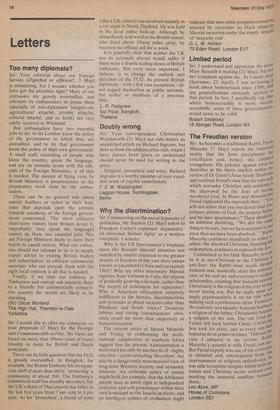Too many diplomats?
Sir: Your editorial about our Foreign Service (Dignified or efficient?, 7 May) is stimulating, but I wonder whether you have got the priorities right? Many of our embassies are grossly overstaffed, and attempts by ambassadors to prune them (specially of non-diplomatic hangers-on: agricultural attaché, atomic attaché, cultural attache, and so forth) are very coldly received in Whitehall.
But ambassadors have two essential jobs to do: to let London know the policy of the government to which they are accredited, and to let that government know the policy of their own government. A small staff, consisting of people who know the country, speak the language, and are on intimate terms with the officials of the Foreign Ministries, is all that is needed. The success of flying visits by British Ministers is proportionate to the preparatory work done by the ambassadors.
There can be no general rule about ostrich feathers or nylon in their hats, since that depends upon the attitude towards ceremony of the foreign government concerned. The most efficient short-term visitors from Britain (even if, improbably, they speak the language) cannot do these two essential jobs. Nor are Foreign Ministers likely to open their hearts to casual visitors. What our embassies should not attempt to do is to supply expert advice to visiting British traders and industrialists: an efficient commercial secretary who can provide them with the right local contacts is all that is needed.
Finally, if we shut our embassy in Timbuctoo and entrust ouk interests there to a friendly but commercially competitive country the results are likely to be alarming.
(Sir) Oscar Modand The High Hall, Thomton-le-Dale Yorkshire Sir: I would like to offer my comments on your proposals (7 May) for the Foreign and Commonwealth service. My views are based on more than fifteen years of travel (mainly in Asia) for British and Dutch principals.
There can be little question that the FCO is grossly overstaffed. In Bangkok, for example, the British Embassy has an expatriate staff of more than thirty, `protecting' a community of about 200. The Embassy's commercial staff has steadily increased, but the UK's share of Thai imports has fallen in the last five years from 7 per cent to 4 per cent. As for 'protection', a friend of mine (also a UK citizen) was involved recently in a car crash in North Thailand. He was held in the focal police lock-up. Although he immediately sent word to the British consul, who lived about fifteen miles away, he received no official aid for a week.
It is painfully clear that neither the UK nor its nationals abroad would suffer if there were a drastic scaling-down of British embassies. But even more important, I believe, is to change the outlook and direction of the FCO. At present British diplomats — with a few rare exceptions — do not regard themselves as public servants, but rather as members of a precious elite.
L. R. Pettigrew Soi Pipat, Bangkok, Thailand


































 Previous page
Previous page